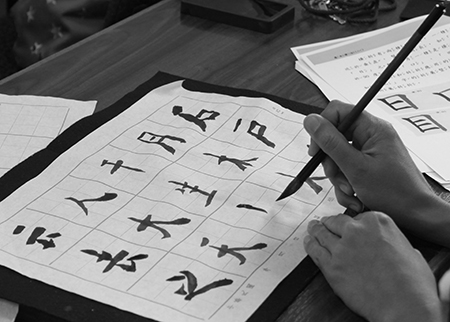Chinese
A rapidly changing society with a history dating back to the 17th Century BC, China comprises 56 ethnic groups which offer a rich heritage of cultural diversity. In recent decades, China has played an increasingly significant role in world culture, economy and politics.
The Chinese speaking population is currently the largest in the world. Learning Chinese opens a window to understanding Chinese culture and way of life.
Why Choose
 The Chinese language is key to understanding the redistribution of power in the Asia-Pacific region. At UQ you will not only study topics such as writing, speaking, and language, but also cultural studies, cinema, literature, history, translation and interpreting. A stream for Teaching Chinese as a Second Language (TCSL) is also available for those students who may wish to teach Chinese in the future.
The Chinese language is key to understanding the redistribution of power in the Asia-Pacific region. At UQ you will not only study topics such as writing, speaking, and language, but also cultural studies, cinema, literature, history, translation and interpreting. A stream for Teaching Chinese as a Second Language (TCSL) is also available for those students who may wish to teach Chinese in the future.
As a student at UQ, you have many opportunities to get involved and enhance your language learning experience, including exchange, joining clubs and participating in conversation classes.
Because of the Chinese population and the frequent interaction between China and Australia, there is always a demand for people with Chinese language skills and cultural understanding. Having an understanding of the language and culture can undoubtedly enhance your competitiveness in the job market.
Career opportunities are unlimited and you are by no means confined to language related fields – although you may choose to work in areas such as translation and interpretation or teach Chinese in Australia. Chinese language skills are also an advantage for careers in diplomacy, law, health, education, technology and academia.
Chinese medicines and medical treatments have become one of the most popular alternative treatments in Australia, and Chinese arts and fengshui have also inspired many Australian architects and designers.
Undergraduate
- Bachelor of Arts
- Chinese Major
- Chinese Translation and Interpreting Major
- Chinese Minor (visit Courses and Programs for further details)
- Bachelor of International Studies
- Diploma in Languages
- Dual Degrees
Honours
Bachelor of Arts (Honours) in Chinese
Pathways
Students may study Chinese courses as electives in their degree, or complete a Chinese Major.
Chinese Majors can be undertaken by students from:
- Introductory level (no previous knowledge of Chinese)
- Intermediate or post-secondary level (for students who have studied Senior Chinese at school)
Separate course starting points apply for students at each level.
A pathway that shows courses over 3 years is available.
View pathway for Chinese Major
Students may study Chinese or Chinese Translation & Interpreting courses as electives in their degree, or complete a Chinese or Chinese Translation & Interpreting Major.
Chinese Majors can be undertaken by students from:
- Introductory level (no previous knowledge of Chinese)
- Intermediate or post-secondary level (for students who have studied Senior Chinese at school)
The Chinese Translation and Interpreting Major is designed for students who are native Chinese speakers.
Separate course starting points apply for students at each level.
A pathway that shows courses over 3 years is available.
View pathway for Chinese Translation and Interpreting Major
Courses available are also listed in the University’s Programs and Courses database.
Unsure where to start?
Go to our online language course placement advisor and answer a short questionnaire. In most cases the system will recommend the starting course you should enrol in. For more complex cases, you will be advised how to proceed.
Postgraduate
- Graduate Certificate in Arts in Chinese Translation and Interpreting (GCACTI)
- Master of Arts in Translation and Interpreting (MATI) (NEW from semester 2, 2022)
- Master of Arts in Chinese Interpreting and Translation (MACTI) (discontinued from SEM 2, 2022)
- Diploma in Arts (DipArts)
What our graduates are doing

Australia/China business consulting
After graduating, James created his own company – an Australian/Chinese business consultancy group for companies who want to import or export with China.
"In China we liaise with manufacturers to have produce made to Australian standards. We speak Chinse and know the culture. We work with manufacturers to procure products and quality control them to bridge the communication gap."
"Everything I studied at UQ has helped me to develop my companies – Chinese language, culture, history, business, law, management skills, communication, marketing, web development, programming, applications and networking."
"After being in China for several years I decided to set up a development facility to help customers build "the golden sample.This gave us better quality and management of our manufacturing".
9 years on, James now runs a clothing factory in China that makes some of Australia's largest brands.
While living in Asia, James built his own surf resort in the Philippines where he spends weeks commuting back and forth from Guangzhou China. "Asia is a hidden surfing gem. It's every Australian's surfer's dream to have a location they call home with pristine waters and uncrowded perfect waves."
From doing something he loves and building a first class facility, James has now developed his own custom surf wear brand. Using 100% eco initiatives and allowing customers the ability to make quality products with full customisation, James now supplies to surfing events worldwide, including Surfing Australia and all regional offices, Surfing Asia and the World Surfing League.
Combining life pleasures and his work in China, it has now mobilised him to surf around the world as a full time job.
James has a Bachelor of Arts (Chinese) from The University of Queensland.
Get involved
Events
There are a number of school events and seminars held throughout the year such at the MAJIT Interpreting Forums and public lectures which students are encouraged to attend. Details for these events are published on the School Events page.
Exchange opportunities
Going on exchange will allow you to further advance your linguistic proficiency while living and studying abroad. UQ has agreements with Universities in over 40 countries around the world, with many at Universities in China such as:
See UQ Abroad for information about the exchange program.
In 2013 Chinese student Joshua went on exchange to Shandong University in China as part of his BCom/LLB/DipLanguages (Chinese) degrees. Read his story here.
Clubs and societies
Joining a club or society is a great way to learn new skills and meet new like-minded people. There are over 190 affiliated clubs and societies at UQ. The Chinese Students and Scholars Association is one such club which offers an opportunity for students to be involved with Chinese-Australian cultural communication,. The UQ Chinese Painting and Calligraphy Club meet regularly for calligraphy or painting lessons. The Chinese Debating Association offer a unique way for you to practice your language and debating skills. Visit clubs and societies for a full list, and find one that interests you.
CHINWag Learning Community
All UQ students enrolled in Chinese are automatically enrolled in the CHINWag Community Site through Blackboard. This site provides information and resources on Chinese related exchange programs, scholarships, courses, community contacts, events, job opportunities, etc.You can find it by typing 'CHINWag' in a Blackboard search (under 'Community Search').
Conversation classes
Conversation classes run all semester in the Gordon Greenwood Building (Building 32), and are a great way for you to practice your language skills.
Details for classes are announced in tutorials each semester. You can also keep an eye on the school noticeboards and the CHINWag Blackboard site for current details.
